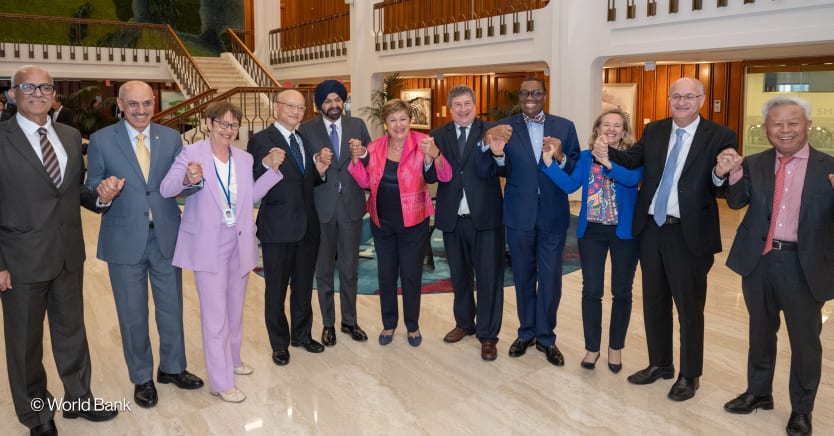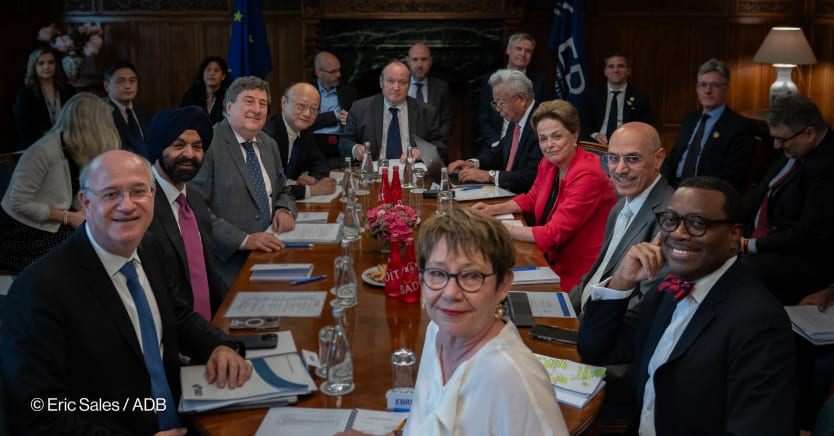Opinion: MDBs must keep acting as a system to meet today’s challenges

Multilateral development banks, or MDBs, emerged from moments of profound global transformation to help nations rebuild, develop, and rekindle the promise of prosperity. Eight decades on, their original mission has lost none of its relevance. Quite the contrary: Faced with shifting priorities and challenges that transcend borders and defy unilateral solutions, MDBs’ mission has become even more imperative. Rising uncertainty, fragility, inequality, and the urgent demand for jobs and growth all underscore the continued need for strong multilateral institutions capable of responding adequately — and at scale.
MDBs have long collaborated at the operational level, cofinancing projects and exchanging knowledge and expertise. Yet, the pressing demands of our time have increasingly compelled us to move beyond episodic cooperation. The aspiration to shift development finance from “billions to trillions” and multiply scarce public resources has, so far, fallen short. Meanwhile, the imperative to generate employment and mobilize additional private capital to advance the Sustainable Development Goals, or SDGs, has only intensified. To respond, MDBs must marshal their collective capacities with greater coherence and shared purpose.
Working as a system means leveraging MDBs’ diversity — diversity in institutional setup, scope, geography of operation, membership — to enhance efficacy and impact by fully exploiting our synergies. Acting as a system is no abstract notion. It is a broad range of very concrete, specific actions, such as sharing project pipelines, recognizing each other’s procedures, streamlining processes, and aligning standards and methodologies. Notably, systemic action does not imply uniformity, lockstep action, or maladroit standardization. Rather, it entails enhancing the overarching architecture so that scarce resources can be deployed in the most efficient and effective way, while each institution continues to contribute its distinctive strengths to the common objectives.
In recent years, this systemic approach has gathered momentum under the impulse of the Group of 20 major economies. Successive presidencies have featured MDBs and the banks’ collaborative efforts more prominently in the agenda, fostering sustained and intensified engagement with the institutions themselves. In 2021, the Independent Review of MDBs’ Capital Adequacy Frameworks was kick-started under Italy’s presidency and carried forward the following year under Indonesia’s leadership. In 2023, India introduced the MDBs’ triple reform agenda under the banner of “better, bigger, and more effective” to regain momentum for the SDGs. In 2024 and 2025, under the Brazilian and South African presidencies, respectively, the G20 Roadmap Towards Better, Bigger, and More Effective MDBs has been established and operationalized as clear guidance to steer MDB efforts toward a shared direction of travel.
MDBs have matched these calls with their own decisive commitment. In particular, the Heads of MDBs Group — which unites the leaders of the 10 major institutions — has emerged as the key forum to advance joint efforts. The group’s informality is one of its defining characteristics — and, at the same time, one of its greatest assets. In fact, its success derives from its discretional and collegial nature, even as it becomes more structured and purposeful. This balance enables the group to adapt fluidly to new imperatives and respond promptly to the evolving priorities of shareholders and clients.
The group is not a new creation. It has existed for years as a venue for dialogue. What distinguishes its current action are the breadth and depth of its engagement, coupled with the determination to deliver change together in ways that have a tangible impact. In 2024, the group spoke with one voice through a joint Viewpoint Note, highlighting areas where key efforts were underway to achieve demanding, concrete objectives. This was an unprecedented signal of ownership and ambition — a reflection of a common sense of purpose from a decidedly diverse set of institutions.

In 2025, under the chairship of the group by the Council of Europe Development Bank, or CEB, this determined commitment has been further consolidated. Together, MDBs have advanced a number of instrumental initiatives. We signed several new mutual reliance agreements to reduce the burden on borrowers and help accelerate project preparation. We are refining the common methodology for capturing private capital mobilization, a key common priority. And we reported to the G20 on the progress on the implementation of the G20 Roadmap towards Bigger, Better and More Effective MDBs.
Importantly, through CEB’s leadership, the group also focused its attention on social infrastructure, including the essential role it plays in achieving sustainable, long-term growth. We underscored our common conviction that access to affordable and high-quality health, education, and housing forms the foundation of human capital and is as vital to prosperity as transport corridors or energy grids.
For CEB, prioritizing such investment comes naturally: Our mandate is exclusively social. We understand how crucial this type of investment is for accumulating human capital, generating employment, boosting productivity, and ultimately delivering the resilient and inclusive growth that sustains flourishing societies. Bringing this vital issue to the forefront of discussions among Heads of MDBs is just one example of the drive that now marks the group, even as we recognize that much, much work still lies ahead.
Indeed, investment in these areas remains far below what is required to meet pressing needs, hampering job creation and inclusive growth — and, more broadly, holding back progress toward the SDGs. To assess this challenge comprehensively and outline possible ways forward, MDBs have just published a new joint report: “Social Infrastructure in Focus: The Role of MDBs.” The report examines current MDB investment in social infrastructure, illustrates institution-specific approaches, and identifies potential areas for future engagement.
Today’s challenges require MDBs to deliver more — and to do so with greater speed and scale, despite mounting uncertainty and volatility. It is a tall order. But MDBs are capable of meeting the challenge if we keep acting as a system and work hand in hand with shareholders. We owe it to the communities we serve and the future generations who will inherit the world we help to shape.
For more information about the Council of Europe Development Bank, visit our website: https://coebank.org/en/

This content is sponsored by the Council of Europe Development Bank as part of Financing the Future — a series exploring how the global development finance system is evolving to unlock capital, reform institutions, and build investable markets for sustainable growth. Click here to learn more.
Search for articles
Most Read
- 1
- 2
- 3
- 4
- 5








